雅思大作文专项突破:跳槽
关于跳槽的英语作文
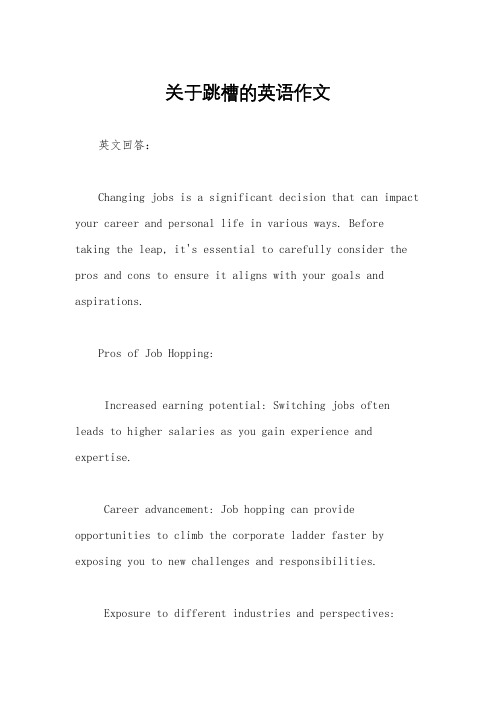
关于跳槽的英语作文英文回答:Changing jobs is a significant decision that can impact your career and personal life in various ways. Before taking the leap, it's essential to carefully consider the pros and cons to ensure it aligns with your goals and aspirations.Pros of Job Hopping:Increased earning potential: Switching jobs often leads to higher salaries as you gain experience and expertise.Career advancement: Job hopping can provide opportunities to climb the corporate ladder faster by exposing you to new challenges and responsibilities.Exposure to different industries and perspectives:Working for multiple companies broadens your knowledge and skills, making you a more versatile candidate.Enhanced job satisfaction: Job hopping allows you to explore different work environments and find a role that aligns with your interests and values.Cons of Job Hopping:Lack of stability: Frequent job changes can create a sense of instability and disrupt your career trajectory.Gaps in employment: Extended periods without employment can raise red flags to potential employers.Damaged reputation: Job hopping can be perceived negatively, especially if it becomes a pattern.Difficulty building relationships: Changing jobs often makes it challenging to establish strong relationships with colleagues and clients.Factors to Consider:Your career goals: Does the new job contribute to your long-term aspirations?The job market: Is it a good time to make a career move?The company and industry: Research the reputation, culture, and growth prospects of the new company.Compensation and benefits: Ensure the compensation package aligns with your expectations and provides adequate benefits.Personal circumstances: Consider the impact of job hopping on your life outside of work, such as family, health, and financial stability.When to Make the Move:There is no one-size-fits-all answer to when to switchjobs. However, it's generally advisable to stay in a position for at least two years before considering a move. This allows you to gain a solid understanding of the company, establish a track record, and build relationships.Conclusion:Job hopping can be a double-edged sword. While itoffers potential benefits such as increased earning potential and career advancement, it also comes with risks like instability and reputational damage. By carefully weighing the pros and cons, considering your personal circumstances, and making strategic moves, you can harness the advantages of job hopping while mitigating thepotential drawbacks.中文回答:关于跳槽的决定关系着你的职业和个人生活,因此在做出改变之前,仔细考虑其利弊至关重要。
跳槽的英语作文
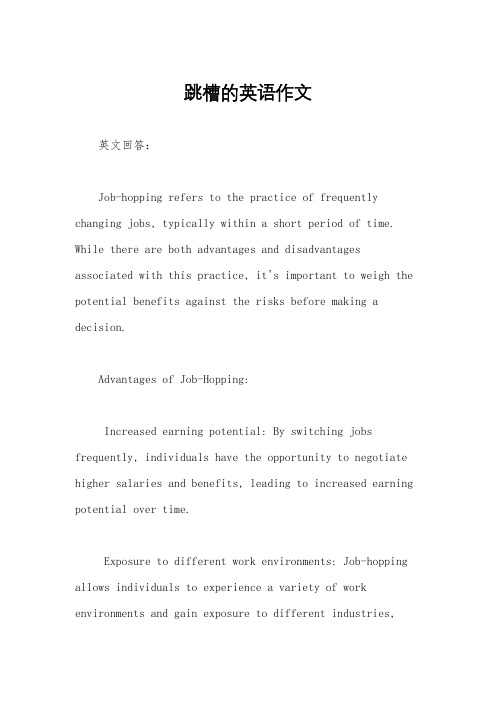
跳槽的英语作文英文回答:Job-hopping refers to the practice of frequently changing jobs, typically within a short period of time. While there are both advantages and disadvantages associated with this practice, it's important to weigh the potential benefits against the risks before making a decision.Advantages of Job-Hopping:Increased earning potential: By switching jobs frequently, individuals have the opportunity to negotiate higher salaries and benefits, leading to increased earning potential over time.Exposure to different work environments: Job-hopping allows individuals to experience a variety of work environments and gain exposure to different industries,companies, and career paths. This can broaden theirskillset and make them more competitive in the job market.Career advancement: For ambitious individuals, job-hopping can provide opportunities for rapid career advancement. By moving from one role to another, they can gain valuable experience and skills that can help them progress in their field.Increased job satisfaction: If an individual is unsatisfied with their current job, job-hopping can offer them the chance to find a more fulfilling and satisfying work experience.Disadvantages of Job-Hopping:Lack of stability: Job-hopping can create a lack of stability in an individual's career and personal life. Frequent job changes can disrupt routines, relationships, and financial planning.Difficulty building relationships: In some industriesor companies, job-hopping can make it difficult to build lasting relationships with colleagues and mentors. This can hinder networking opportunities and career growth.Negative perception: Some employers may view job-hoppers as unreliable or disloyal, which can affect their chances of securing future employment.Lost benefits: Frequent job changes can result in the loss of accumulated benefits, such as seniority, vacation time, and retirement savings.Deciding Whether Job-Hopping Is Right for You:The decision of whether or not to engage in job-hopping depends on several factors, including career goals, financial situation, and personal circumstances. Here are some guidelines to consider:Consider your industry: Some industries, such as tech or finance, are more conducive to job-hopping than others.Assess your financial situation: If you have significant financial obligations, job-hopping may not be a viable option.Evaluate your career goals: If you are ambitious and seeking rapid career advancement, job-hopping can be beneficial.Consider your personal circumstances: Factors such as family obligations, relocation, and lifestyle preferences can influence whether or not job-hopping is appropriate.中文回答:跳槽的优缺点。
跳槽的利弊英语作文(3篇)
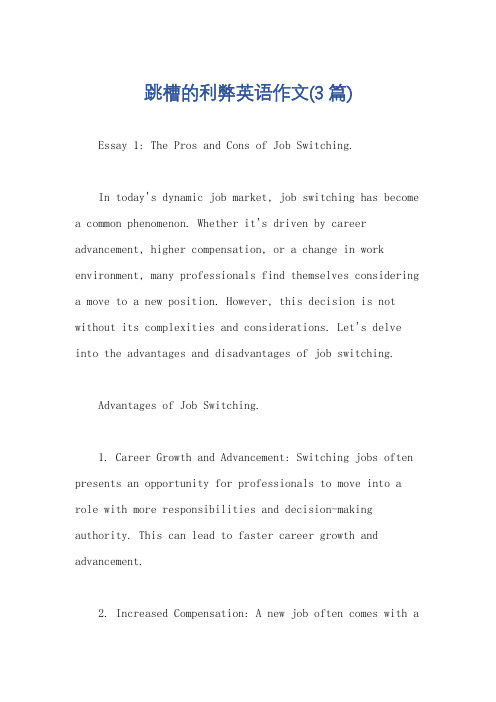
跳槽的利弊英语作文(3篇)Essay 1: The Pros and Cons of Job Switching.In today's dynamic job market, job switching has become a common phenomenon. Whether it's driven by career advancement, higher compensation, or a change in work environment, many professionals find themselves considering a move to a new position. However, this decision is not without its complexities and considerations. Let's delve into the advantages and disadvantages of job switching.Advantages of Job Switching.1. Career Growth and Advancement: Switching jobs often presents an opportunity for professionals to move into a role with more responsibilities and decision-making authority. This can lead to faster career growth and advancement.2. Increased Compensation: A new job often comes with ahigher salary and better compensation packages. This is a significant motivation for many professionals who are seeking to improve their financial standing.3. Learning New Skills and Knowledge: Every organization has its unique way of doing things. By switching jobs, professionals have the opportunity to learn new skills, methods, and technologies that can broadentheir knowledge base and enhance their market value.4. Improved Work-Life Balance: Sometimes, a change in job can lead to a more.。
跳槽的利弊英语作文
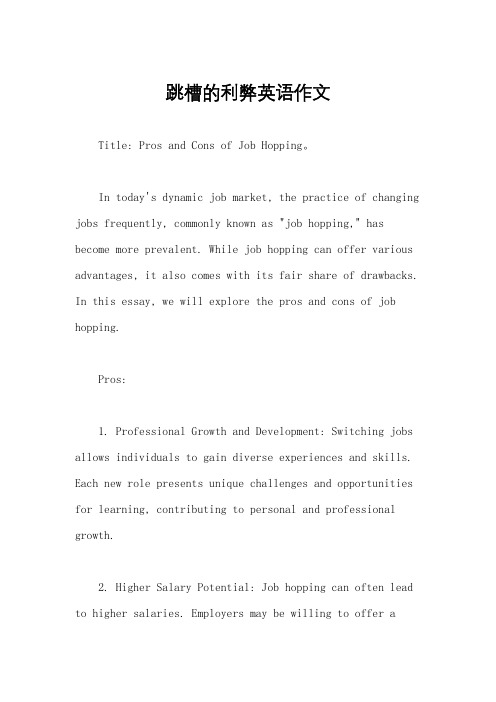
跳槽的利弊英语作文Title: Pros and Cons of Job Hopping。
In today's dynamic job market, the practice of changing jobs frequently, commonly known as "job hopping," has become more prevalent. While job hopping can offer various advantages, it also comes with its fair share of drawbacks. In this essay, we will explore the pros and cons of job hopping.Pros:1. Professional Growth and Development: Switching jobs allows individuals to gain diverse experiences and skills. Each new role presents unique challenges and opportunities for learning, contributing to personal and professional growth.2. Higher Salary Potential: Job hopping can often lead to higher salaries. Employers may be willing to offer ahigher pay package to attract talented individuals with a proven track record of success in their previous roles.3. Expanded Network: Moving from one job to another exposes individuals to different professional networks. Building a broad network of contacts can open doors to future career opportunities and collaborations.4. Escape from Stagnation: For those feeling stagnant or unfulfilled in their current roles, job hopping can provide a fresh start. It allows individuals to break free from monotony and seek out positions that align better with their interests and career goals.5. Adaptability and Resilience: Job hopping requires adaptability and resilience. Constantly navigating new work environments and challenges can enhance these crucial skills, making individuals more versatile and valuable in the job market.Cons:1. Lack of Job Stability: One of the most significant drawbacks of job hopping is the lack of job stability. Employers may view frequent job changes as a red flag, questioning the candidate's commitment and reliability.2. Limited Opportunity for Advancement: Longevity in a role often correlates with advancement opportunities within a company. Job hoppers may miss out on promotions and career progression due to their shorter tenures at each organization.3. Difficulty Building Deep Relationships: Building meaningful relationships with colleagues and mentors takes time. Constantly changing jobs can hinder the development of these connections, which are crucial for long-term career success and satisfaction.4. Financial Implications: Job hopping can have financial implications, especially if it involves periods of unemployment between transitions. Individuals may also miss out on benefits such as retirement plans and health insurance that come with tenure at a single employer.5. Reputation and Perception: Job hopping can affect one's professional reputation and how they are perceived by employers. Some may view frequent job changes as a sign of disloyalty or an inability to commit, potentially impacting future job prospects.In conclusion, job hopping offers both advantages and disadvantages. While it can facilitate professional growth, higher salaries, and expanded networks, it also comes with challenges such as job instability, limited advancement opportunities, and financial implications. Ultimately, individuals must carefully weigh these factors and consider their long-term career goals before deciding whether job hopping is the right path for them.。
专四英语作文跳槽的看法

专四英语作文跳槽的看法英文回答:In today's rapidly changing job market, switching jobs (or "job hopping") has become increasingly prevalent among professionals. This trend is driven by a number of factors, including the desire for career advancement, higher salaries, better benefits, and a more fulfilling work experience. While some employers may view job hopping negatively, others recognize its potential benefits and are more open to hiring candidates with a history of job transitions.There are several advantages to job hopping. First and foremost, it allows individuals to gain valuable experience across different industries, companies, and roles. This broad perspective can make job hoppers more marketable and competitive in the employment market. Second, job hopping can accelerate career growth. By moving from one company to another, individuals can take on new challenges, gainexposure to new technologies and skills, and advance their careers more quickly than they would if they remained in one position for an extended period of time. Third, job hopping can lead to higher salaries and better benefits. As individuals gain experience and move up the corporate ladder, they are generally compensated more generously.Of course, there are also some potential drawbacks to job hopping. One concern is that it can be disruptive to one's career. Frequent job changes can make it difficult to build strong relationships with colleagues and mentors, and it can also lead to a lack of continuity in one's work experience. Another concern is that job hopping can be perceived negatively by some employers. Some employers may view job hoppers as disloyal or uncommitted, and they may be hesitant to hire candidates with a history of frequent job changes.Ultimately, the decision of whether or not to job hop is a personal one. There is no right or wrong answer, and the best decision will vary depending on each individual's circumstances and career goals. However, it is important toweigh the potential benefits and drawbacks carefully before making a decision.中文回答:跳槽,或称“换工作”,在当今快速变化的就业市场中变得越来越普遍。
跳槽好处英文作文

跳槽好处英文作文Jumping jobs can bring numerous benefits. Firstly, it offers the opportunity to explore new career paths and expand one's skill set. By moving to a different company or industry, individuals can gain exposure to differentworking environments and learn new techniques or approaches. This can enhance their professional development and make them more versatile in the job market.Secondly, changing jobs can lead to higher salaries and better benefits. As employees gain experience and skills, they become more valuable to employers. This increasedvalue can translate into higher pay and improved benefits packages. By seeking new opportunities, individuals can negotiate better compensation packages and improve their financial situation.Additionally, switching jobs can provide a fresh start and a chance to escape a stagnant or toxic work environment. Sometimes, individuals find themselves stuck in a job thatno longer challenges or motivates them. By moving to a new company, they can find renewed inspiration and enthusiasmfor their work. This can lead to increased job satisfaction and overall happiness.Moreover, changing jobs can expand one's professional network. By joining a new organization, individuals havethe opportunity to meet new colleagues and industry professionals. These connections can open doors to future career opportunities, mentorship, and collaborations. Building a strong network is crucial for career growth and advancement.Furthermore, jumping jobs can help individuals gain a broader perspective and learn from different management styles and organizational cultures. Each company has itsown unique way of doing things, and by experiencingdifferent work environments, individuals can learn what works best for them and develop their own leadership skills. This exposure to diverse management styles can make individuals more adaptable and effective in their future roles.Lastly, changing jobs can provide individuals with a sense of personal growth and accomplishment. By taking on new challenges and successfully transitioning to a new role, individuals can boost their self-confidence and self-esteem. This can have a positive impact on other areas of theirlives and contribute to their overall personal development.In conclusion, jumping jobs can bring a range of benefits, including career exploration, higher salaries, improved work environment, expanded network, exposure to different management styles, and personal growth. It is important for individuals to carefully consider theircareer goals and weigh the potential advantages before making a decision to switch jobs.。
关于跳槽的英语作文
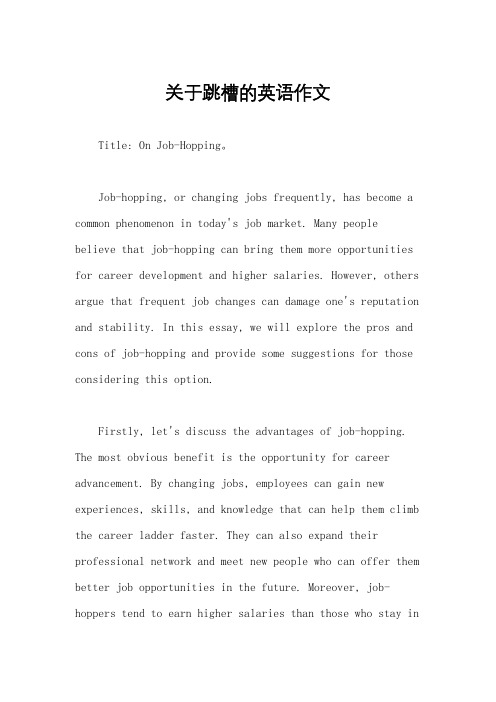
关于跳槽的英语作文Title: On Job-Hopping。
Job-hopping, or changing jobs frequently, has become a common phenomenon in today's job market. Many people believe that job-hopping can bring them more opportunities for career development and higher salaries. However, others argue that frequent job changes can damage one's reputation and stability. In this essay, we will explore the pros and cons of job-hopping and provide some suggestions for those considering this option.Firstly, let's discuss the advantages of job-hopping. The most obvious benefit is the opportunity for career advancement. By changing jobs, employees can gain new experiences, skills, and knowledge that can help them climb the career ladder faster. They can also expand their professional network and meet new people who can offer them better job opportunities in the future. Moreover, job-hoppers tend to earn higher salaries than those who stay inthe same job for a long time. This is because employers are willing to pay a premium for employees who have a diverseset of skills and experiences.On the other hand, job-hopping also has its drawbacks. One of the biggest disadvantages is the negative impact on one's reputation. Frequent job changes may make employers doubt the employee's loyalty and commitment to the job.They may also question the employee's ability to work well with others and adapt to new environments. Additionally,job-hopping can create a sense of instability and uncertainty, which can be stressful for some employees.They may find it difficult to establish roots in a new workplace and build long-term relationships with colleagues.So, what should you consider before deciding to job-hop? Firstly, you should evaluate your career goals anddetermine whether changing jobs will help you achieve them. If you are looking for new challenges, opportunities for growth, or a higher salary, then job-hopping may be a good option for you. However, if you are happy with your current job and have a good relationship with your employer, thenyou may want to stay put. Secondly, you should consider the potential risks and benefits of job-hopping. Think about how it may affect your reputation, stability, and future job prospects. Finally, you should plan your job search carefully and be selective about the jobs you apply for. Look for positions that align with your skills, interests, and career goals.In conclusion, job-hopping can be a double-edged sword. While it can bring many benefits, such as career advancement and higher salaries, it can also have negative consequences, such as damaging your reputation and creating instability. Therefore, it is important to weigh the pros and cons carefully and make an informed decision based on your career goals and personal circumstances.。
关于跳槽的英文作文

关于跳槽的英文作文英文:As someone who has experienced changing jobs multiple times, I can say that there are both pros and cons to jumping ship. On one hand, switching companies can lead to higher salaries, better benefits, and more opportunitiesfor career advancement. On the other hand, it can be difficult to build strong relationships with colleagues and managers, and constantly starting over in a new workplace can be exhausting.For me, the decision to switch jobs has always come down to a combination of factors, including salary, job security, and work-life balance. I recently left a job where I was making a decent salary, but the company was struggling financially and it was clear that layoffs were on the horizon. I ultimately decided to take a job with a lower salary, but with a more stable company and better work-life balance.It's also important to consider the industry you're in and the job market. In some fields, like tech or finance,job hopping is more common and may even be expected. In others, like academia or government, it may be frowned upon.Overall, I think it's important to weigh the pros and cons and make a decision that aligns with your personal and professional goals. It's okay to take risks and try new things, but it's also important to be strategic and thoughtful in your career decisions.中文:作为一个多次跳槽的人,我可以说,跳槽有利有弊。
- 1、下载文档前请自行甄别文档内容的完整性,平台不提供额外的编辑、内容补充、找答案等附加服务。
- 2、"仅部分预览"的文档,不可在线预览部分如存在完整性等问题,可反馈申请退款(可完整预览的文档不适用该条件!)。
- 3、如文档侵犯您的权益,请联系客服反馈,我们会尽快为您处理(人工客服工作时间:9:00-18:30)。
雅思大作文专项突破:跳槽
本文收集整理了雅思大作文专项突破:跳槽。
这是目前常见的、高频的雅思写作话题,同学们在备考时可以边写边学,积累写作素材,以便在考试中更胸有成竹。
Topic 22: Some people think that changing jobs periodically is good. What is your opinion?
解析:
换工作/跳槽(job-hopping )的好处:
? 目前的工作不能够充分发挥自己的能力(make the best use of one's abilities),也不能够提高技能和增加经验(improve skills and gain new experience) 换工作(switching jobs)可以发展多种技能(acquire a wide array of technical skills),丰富个人简历(enhance the resume),提高个人的市场价值和工作稳定性(improve marketability and job security),有助于收人增加(pay raise);
? 竞争激烈,如果不主动增加技术和经验(improve skills and experience levels),稳定的工作机会就会很少(continued employment will be meagre),很容易在竞争中失利(vulnerable to the competition);就职业生存而言(in terms of career survival),没有高枕无忧的空间(there is no room for
complacency);人应该懂得接受挑战,把握机会(take on new challenges and seize opportunities),这才是理智的职业选择(a sound career move);
? 离开目前的雇主(leave the current employer)会绐自己一种新的期待(a sense of anticipation), —种新的学习热情(generate an enthusiasm to learn)。
换工作/跳槽(job-hopping)的坏处:
? 对自己的职业发展弊大于利(do more harm than good to one's career);需要付出努力去适应新环境(adjust to the new environment),不能够与新同事和上司处好关系(get along well with new colleagues and supervisors),有可能被他们视为威胁(seen as a threat),工作表现不能被轻易认同(readily being recognised);
? 频繁转换工作反一个人的低承受能力和对雇主的低忠诚度(reflect badly on the job candidate's resilience and loyalty),缺乏工作动力(lack of
self-motivation),没有目标(directionless/aimless),没有足够时间获得经验和技能(gain experiences and on-the-job skills),因此雇主不愿意聘用经常换工作的人,担心很快又要重新招聘(restart a new recruiting process)。
范文
In this fast-changing world, job-hopping (leaving the current employer for another employment opportunity) is not a rare scene. Much has been discussed about the gains and losses of such a career move. In my opinion, job-changing is an inevitable step in today's labour market, reflecting the nature of a modem society.
A new job implies opportunities for career development, an objective many working people intend to achieve. In general, there are two reasons behind a job holder's motive for a new job. The first is that the current job cannot make the best use of his or her abilities. The second is that he or she cannot improve skills and gain new experience. Both can lessen the possibility of a brighter job prospect.
Job-hopping, meanwhile, assists one to survive the keen competition. People are living in a fast-changing world and a. once stable job is now vulnerable. Willingness to stay on the same job is no longer valued as much as before. Any employee, if complacent about the current employment, would be faced with threats posed by others. By comparison, taking the initiative to obtain a better job can at least drive people to increase skills and thereby improving the chance of continued employment.
When job-hoppers are craving for new chances, some issues are particularly worthy of concern. The first is adjusting to a new environment, such as working with new colleagues and supervisors. Besides, while valuing a job hopper's resume, employers too often tend to suspect his or her loyalty and resilience. It is therefore imperative for every potential jobseeker to learn the new employer better and evaluate the potential risk.
The above-mentioned facts give one a glimpse of the potential results of changing jobs. When the willingness to change a job and seize an opportunity represents a sound career move and provides the thrust for self-development, it might require a job applicant's extra efforts.
近义词表
1. inevitable = inescapable= unavoidable:不可避免的
2. keen=intense=strong=stiff:激烈的
3. vulnerable=in a weak position=defenseless:不稳定的,容易遭受袭击的
4. complacent=satisfied=unworried=contented: 对。
满意的,放心的
5. chance=possibility=likelihood=prospect: 机会,几率
6. crave for=long for=desire=yearn for: 渴望
7. resilience=flexibility=resistance: 柔韧性,抵抗力
8. glimpse=glance=quick look:看
9. thrust=driving force=impetus: 动力。
